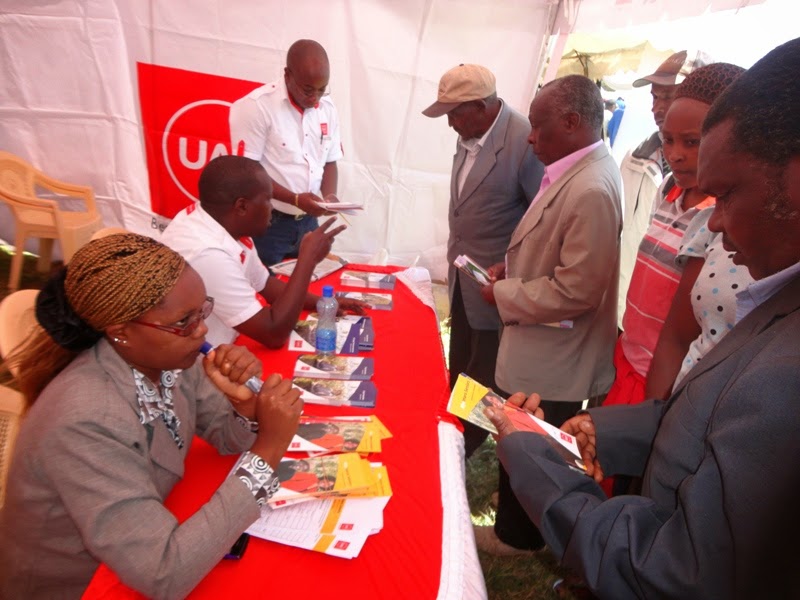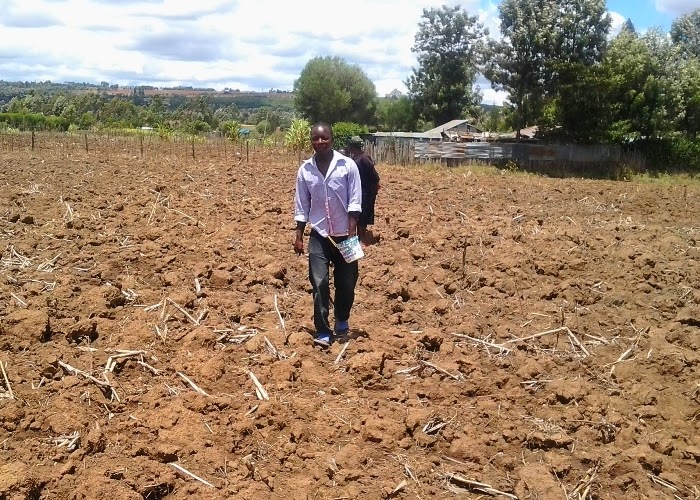By Bob Aston
Representatives from various
organizations erected their stands and gave an insight of the products they
have to the attendants. Among those present included: Syngenta, Kenya Seed
Company Ltd, Ministry of Agriculture, Livestock and Fisheries, Agro Solutions
Ltd, Arid Lands Information Network (ALIN), Pioneer Kenya Ltd, Osho Chemicals, Monsanto
(Seminis) and several community based organizations.
“Holding the field day at Mathenge’s
farm has enabled other farmers to also learn from him about water harvesting. We
have been encouraging farmers to harvest water instead of depending on rain fed
agriculture,” said Elcy.
Residents of Makutano B village in
Laikipia County were treated to an agricultural field day on March 27, 2014. The
field day was held at Elijah Mathenge’s farm. This is part of agricultural
activities in Sipili Division organized by agricultural stakeholders forum.
The theme of the day was “Good seed for better yield.”
 |
| Sam from Ng'arua Maarifa Centre training some farmers about Sokopepe |
Speaking during the event Samwel
Kiige, Field Officer Ministry of Agriculture, Sipili division urged farmers to
follow proper planting methods in order to enjoy maximum benefits from their
farms. Kiige said that practicing good crop husbandry would ensure that farmers
get good returns from their farming activities.
“It was a good day. Farmers have
received a lot of training from crop production to weeding. I hope they will
practice what they have learned during the training,” said Kiige.
Elcy Kigano, Divisional Crop Officer,
Ministry of Agriculture, Sipili division said that the field day was meant for
farmers to interact with various stakeholders and learn from them. She said
that the field day was also a day when farmers interact with their fellow farmers
and share experiences and challenges that they encounter.
 |
| Livestock officer training some farmers about breeding |
Members of the community were asked
to embrace new technologies in farming. They were encouraged to use internet
services to learn various methods of farming. Farmers were also encouraged to
use Sokopepe- an online and SMS based
platforms that provide market prices information to farmers and links farmers
with buyers.
Farmers were informed that Sokopepe will help them to query prices
in major towns in Kenya and make an informed decision on where to sell and at
what price thus have a bargaining power.
Peter Mukono, a Livestock extension
officer with the Ministry of Agriculture, Livestock and Fisheries said that he
was happy as the field day was successful.
Mukono said that farmers were trained
by government staff and private practitioners on most of the enterprises
pertaining livestock.
“Enterprises covered were bee
keeping, rabbit production, breeding and dairy goat. Most of the emphasis was
on fodder establishment since this is the right season for establishing fodder,”
said Mukono.
























